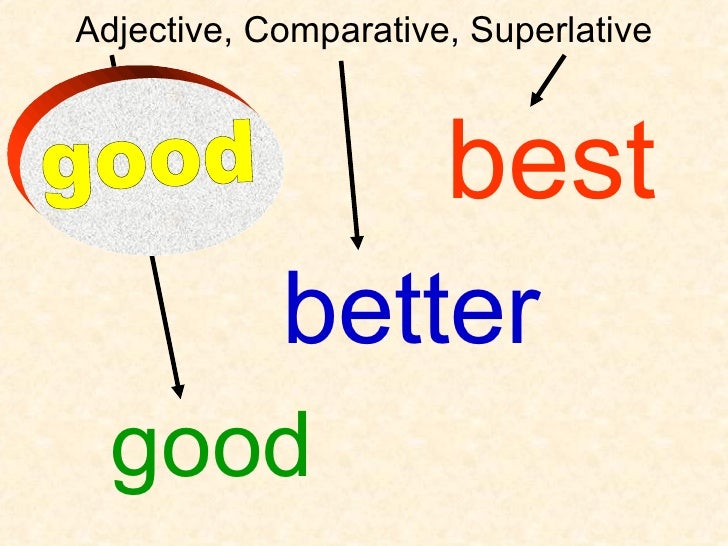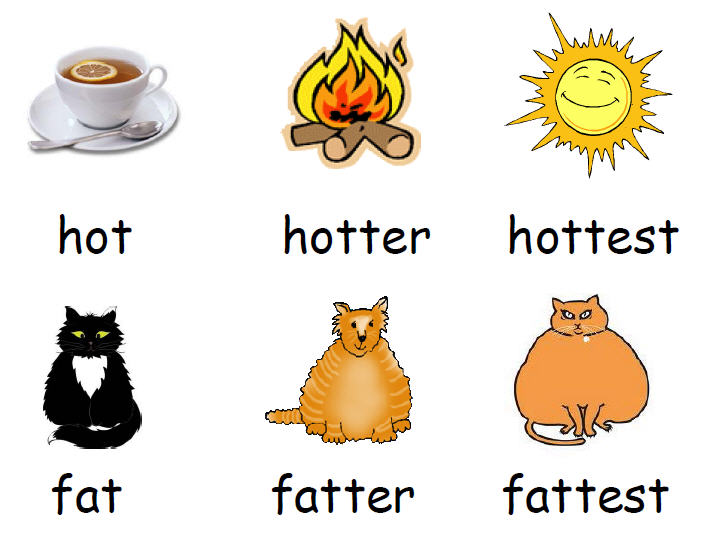Task 2: Make up sentences. Example: The grey car is bigger than the yellow one.
Task 3: Watch these videos. They will help you understand comparatives and superlatives.

RULE 1A - one syllable adjectives or adverbs:
|
||||||
Regular adjective
|
Comparative form
Simply
add -er
|
Superlative form
Use
the and add -est
|
Add other adjectives
|
|||
1. smart
|
1.
smarter than
|
1.
the smartest
|
fast, old,
tall, young
|
|||
RULE 1B - one syllable adjectives with a “Consonant-Vowel-Consonant patter”:
|
||||||
Regular adjective
|
Comparative form
If
the adj. has a CVC pattern, double the consonant and add – er.
|
Superlative form
If
the adj. has a CVC pattern, double the consonant and add -est
|
Add other adjectives
|
|||
1. wet
|
1. wetter than
|
1. the wettest
|
red, sad, thin, fat, fit, big
|
|||
RULE 2 - one syllable adjectives ending in –e :
|
||||||
Regular adjective
|
Comparative form
Simply
add -r
|
Superlative form
Use
the and add -st
|
Add other adjectives
|
|||
1. cute
2. large
|
1. cuter than
2.
|
1. the
cutest
2.
|
wise,
strange, late, close,
huge, brave, blue
|
|||
RULE 3 - Two syllable adjectives ending in –y :
|
||||||
Regular adjective
|
Comparative form
Change
the y to i and add – er. Don’t forget than!
|
Superlative form
Change
the y to i and add – est. Don’t forget the!
|
Add other adjectives
|
|||
1. pretty
|
1. prettier than
|
1. the prettiest
|
busy, angry,
happy, heavy
|
|||
RULE 4 - Two syllable adjectives ending in –er, le or ow :
|
||||||
Regular adjective
|
Comparative form
Simply
add -er
|
Superlative form
Use
the and add -est
|
Add other adjectives
|
|||
1. narrow
|
1. narrower than
|
1. the narrowest
|
gentle
|
|||
RULE 5 - Two syllable adjectives that follow
two rules. These adjectives can be used with –er, and – est and with more or most:
|
||||||
1. clever
|
1. cleverer or more clever than
|
1. cleverest
or the
most clever
|
friendly,
quiet, simple
|
|||
RULE 6 - Two or more syllable adjectives. These
adjectives are used with more…than or the most:
|
||||||
1. pleasant
|
1. more pleasant than
|
1. the most
pleasant
|
careful, generous, intelligent, delicious
|
|||
RULE 7 - These are
the irregular adjectives. There is no system or pattern here, so you'll just
have to remember them. Fortunately, there are only a few...
|
||||||
1. good
2. bad
|
1. better than
2. worse than
|
1.
the best
2.
the worst
|
far, well,
badly, little
|
|||



1-syllable adjectives: add -er to the adjective
In the superlative you talk about one thing only and how it is the best, worst, etc. You do not compare two things. The following guidelines apply to the superlative:
1-syllable adjectives: add -est to the adjective (plus the)
Following are two common irregular comaparative/superlative forms:
The following guidelines apply to the comparative/superlative of mostadverbs:
1-syllable adverbs: add -er/-est
Other adverbs: use more / the most*
- My sister is much taller than me.†
- It's colder today than it was yesterday.
Note: If the word ends: consonant-vowel-consonant, then the last consonant is usually doubled in the comparative. Examples: big-bigger, fat-fatter, hot-hotter.
2-syllable adjectives ending in -y: change the -y to -ier- She's looking happier today.
- This grammar topic is easier than the last one.
- Why is everyone else luckier than me? †
Beware: Do not confuse adjectives and adverbs. 2-syllable adverbs ending in -y must be compared with the word more. Example: I drive more quickly (quicklier) than my brother.
Other 2-syllable adjectives: use more with the unchanged adjective- The shops are always more crowded just before Christmas.
- Is there anything more boring than reading about grammar?
- My sister is more careful with her writing than I am with mine.
Note: The comparative of some shorter 2-syllable adjectives can be formed with -er. Examples: simple-simpler, clever-cleverer, narrow-narrower. To be sure which comparative method to use, you will need to consult a good dictionary.
Adjectives with 3 or more syllables: use more with the unchanged adjective- Russian grammar is more difficult than English grammar.
- My sister is much more intelligent than me.†
- I find maths lessons more enjoyable than science lessons.
- The older you get, the more irritating you become.
In the superlative you talk about one thing only and how it is the best, worst, etc. You do not compare two things. The following guidelines apply to the superlative:
1-syllable adjectives: add -est to the adjective (plus the)
- My sister is the tallest in our family.
- Yesterday was the coldest day of the year so far.
Note: If the word ends: consonant-vowel-consonant, then the last consonant is usually doubled in the superlative. Examples: big-biggest, fat-fattest, hot-hottest.
2-syllable adjectives ending in -y: change the -y to -iest (plus the)- The richest people are not always the happiest.
- Which do you think is the easiest language to learn?
- She's the luckiest person I know.
Beware: Do not confuse adjectives and adverbs. 2-syllable adverbs ending in -y form their superlative with the words the most. Example: Of all the people I know my father drives the most quickly (quickliest).
Other 2-syllable adjectives: use the most with the unchanged adjective- The most boring thing about ESL class is doing grammar exercises.
- My sister is the most careful person I know.
Note: The superlative of some shorter 2-syllable adjectives can be formed with -er. Examples: simple-simplest, clever-cleverest, narrow-narrowest. To be sure which superlative method to use, you will need to consult a good dictionary.
Adjectives with 3 or more syllables: use the most with the unchanged adjective- Some people think that Russian is the most difficult language.
- Albert Einstein was the most intelligent person in history.
- My most enjoyable class is English.
- You are the most irritating person I have ever met!
Following are two common irregular comaparative/superlative forms:
- good-better-the best
- bad-worse-the worst
The following guidelines apply to the comparative/superlative of mostadverbs:
1-syllable adverbs: add -er/-est
- I can run faster than you. / I can run the fastest in my class.
- She works harder than me.† / She works the hardest of all students.
Other adverbs: use more / the most*
- She ran more quickly than me.† / Of all the students she ran the most quickly.
* In informal English it is common to hear the adjectival comparative/superlative form of two-syllable adverbs. For example: She ran quicker than me.† | She ran the quickest.
† Many educated English speakers prefer to use the nominative plus a verb rather than the accusative in such comparative sentences, especially in formal situations. They say, for example, My sister is taller than I am. or She ran more quickly than I did.The alternative, omitting the verb as in the following examples, is considered to be even more formal and is avoided by most British English speakers: My sister is taller than I. orShe ran more quickly than I.
More exercises





Here you have a link where you have more exercises that will help you for your exams.
ReplyDeletehttps://www.englishexercises.org/makeagame/viewgame.asp?id=6009